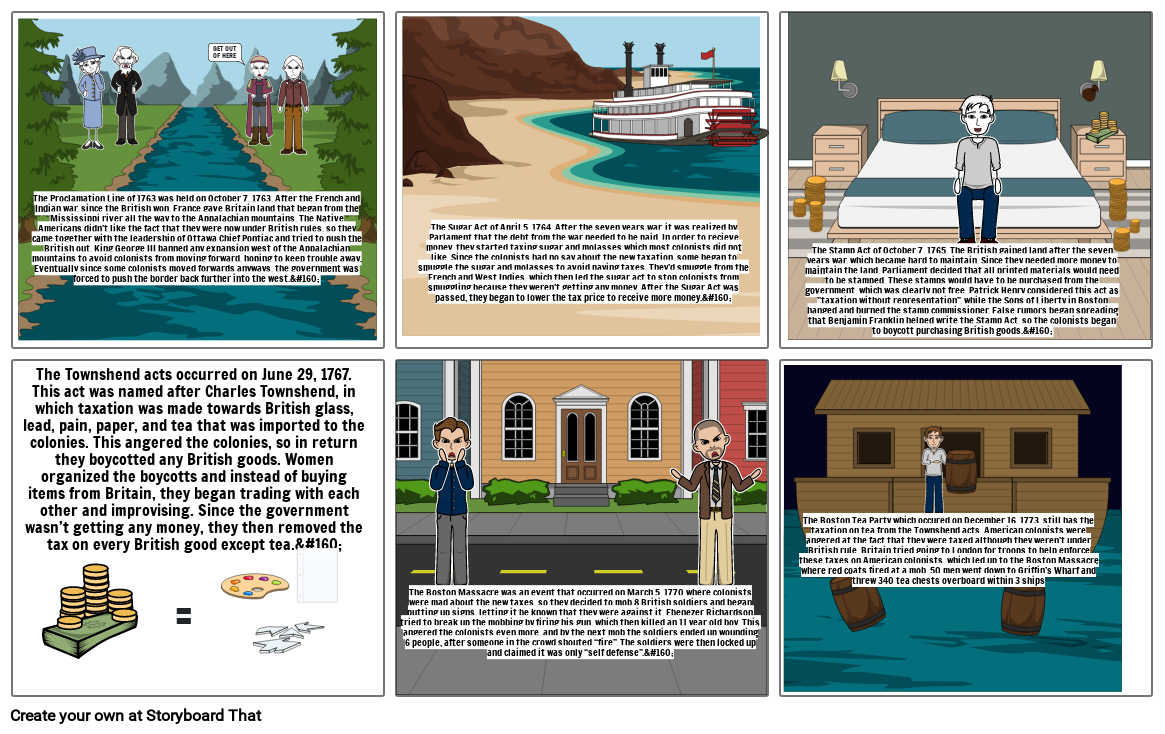6 cells storyboard history

Texto del Guión Gráfico
- The Proclamation Line of 1763 was held on October 7, 1763. After the French and Indian war, since the British won, France gave Britain land that began from the Mississippi river all the way to the Appalachian mountains. The Native Americans didn’t like the fact that they were now under British rules, so they came together with the leadership of Ottawa Chief Pontiac and tried to push the British out. King George III banned any expansion west of the Appalachian mountains to avoid colonists from moving forward, hoping to keep trouble away. Eventually since some colonists moved forwards anyways, the government was forced to push the border back further into the west.
- GET OUT OF HERE
- The Sugar Act of April 5, 1764. After the seven years war, it was realized by Parlament that the debt from the war needed to be paid. In order to recieve money, they started taxing sugar and molasses which most colonists did not like. Since the colonists had no say about the new taxation, some began to smuggle the sugar and molasses to avoid paying taxes. They’d smuggle from the French and West Indies, which then led the sugar act to stop colonists from smuggling because they weren’t getting any money. After the Sugar Act was passed, they began to lower the tax price to receive more money.
- The Stamp Act of October 7, 1765. The British gained land after the seven years war, which became hard to maintain. Since they needed more money to maintain the land, Parliament decided that all printed materials would need to be stamped. These stamps would have to be purchased from the government, which was clearly not free. Patrick Henry considered this act as ”taxation without representation”, while the Sons of Liberty in Boston hanged and burned the stamp commissioner. False rumors began spreading that Benjamin Franklin helped write the Stamp Act, so the colonists began to boycott purchasing British goods.
- The Townshend acts occurred on June 29, 1767. This act was named after Charles Townshend, in which taxation was made towards British glass, lead, pain, paper, and tea that was imported to the colonies. This angered the colonies, so in return they boycotted any British goods. Women organized the boycotts and instead of buying items from Britain, they began trading with each other and improvising. Since the government wasn’t getting any money, they then removed the tax on every British good except tea.
- =
- The Boston Massacre was an event that occurred on March 5, 1770 where colonists were mad about the new taxes, so they decided to mob 8 British soldiers and began putting up signs, letting it be known that they were against it. Ebenezer Richardson tried to break up the mobbing by firing his gun, which then killed an 11 year old boy. This angered the colonists even more, and by the next mob the soldiers ended up wounding 6 people, after someone in the crowd shouted “fire”. The soldiers were then locked up and claimed it was only “self defense”.
- The Boston Tea Party which occured on December 16, 1773, still has the taxation on tea from the Townshend acts. American colonists were angered at the fact that they were taxed although they weren’t under British rule. Britain tried going to London for troops to help enforce these taxes on American colonists, which led up to the Boston Massacre where red coats fired at a mob. 50 men went down to Griffin’s Wharf and threw 340 tea chests overboard within 3 ships
Más de 30 millones de guiones gráficos creados

